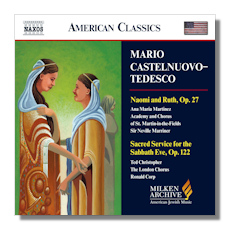
The Internet's Premier Classical Music Source
Related Links
- Castelnuovo-Tedesco Reviews
- Latest Reviews
- More Reviews
-
By Composer
-
Collections
DVD & Blu-ray
Books
Concert Reviews
Articles/Interviews
Software
Audio
Search Amazon
Recommended Links
Site News
 CD Review
CD Review
Mario Castelnuovo-Tedesco

Sacred Music
- Naomi and Ruth, Op. 27 1
- Sacred Service for the Sabbath Eve, Op. 122 2
- Prayers My Grandfather Wrote (excerpts) 3
- Memorial Service for the Departed (excerpts) 4
1 Ana Maria Martinez, soprano
2 Ted Christopher, baritone
2 Jeremy Cohen, tenor
2 Rabbi Rodney Mariner, speaker
2 Hugh Potton, organ
3 Barbara Harbach, organ
4 Cantor Simon Spiro, tenor
4 McNeil Robinson, organ
1 Academy & Chorus of St. Martin-in-the-Fields/Neville Marriner
2 The London Chorus/Ronald Corp
4 New York Cantorial Choir/Neil Levin
Naxos 8.559404 69:40
Summary for the Busy Executive: I need hot sauce with some of this.
This recording belongs to the collaborative recording series of Naxos and the Milken Archives of American Jewish Music. So far, every disc I've heard has been at least interesting – some wonderful, plugging the holes with works for which many collectors have been clamoring for years.
Mario Castelnuovo-Tedesco came from a family of Italian Jews going back to Roman times. Despite the Tedesco part of his last name, there was no German or Central European ancestor. His grandfather added the name as a condition of inheritance from a childless couple. The composer studied with Ildebrando Pizzetti and by the Twenties had made a name for himself as a neoclassic composer. The anti-Jewish laws under Mussolini persuaded him to emigrate to the United States, where he established himself in Los Angeles, becoming part of an illustrious refugee community that included Schoenberg, Stravinsky, Toch, Eisler, and Mann. Today, he's probably best known for the guitar music he wrote for Segovia, including the concerto of 1939, and record collectors will probably remember the violin concerto, I Profeti, for Heifetz. He also worked for Hollywood – mostly C-pictures, stock music, and uncredited – but did manage to score the Spencer Tracy Dr. Jeckyll and Mr. Hyde, The Picture of Dorian Gray, and (with Rózsa) Time Out of Mind. Along with Zador, Toch, and Elmer Bernstein, he managed to teach many film composers their craft.
Castelnuovo-Tedesco's music exhibits a great deal of craft, but in general little inspiration. The music can be beautiful, but seldom strongly memorable. He settled on no one style, preferring to let the subject or the genre dictate the manner. I tend to prefer the neoclassic works. Naomi and Ruth, a cantata on the Bible story for solo soprano and chorus, in my judgment demonstrates the composer's strengths and weaknesses. The soprano takes the part of Naomi, while the chorus handles narration and the words of Ruth. Unfortunately, the music for chorus far exceeds the music for soprano. The soprano part doesn't sound like much of anything, frankly, except possibly Carrie Jacobs-Bond, but the choral passages are quite fine. The Sacred Service also shows the composer's great unevenness, some sections so much better than others that I wondered whether he wrote it to deadline (he didn't).
For me, the best works on the disc are the organ preludes from the set Prayers My Grandfather Wrote, where Castelnuovo-Tedesco takes a melodic theme (or figured bass line) written by his maternal grandfather and makes variations, and the excerpts from the Memorial Service for the Departed. In both works, the composer seems to find stronger ideas than usual and from them creates music that matters to a listener, rather than something pretty enough for the passing moment.
The performances are mostly top-drawer. Neville Marriner, Ana Martinez, and the ASMF do an outstanding job on Naomi and Ruth – clear attacks, beautiful tone from soloist, choir, and orchestra, and diction so good you don't need the text in front of you. More than once, the performance struck me as far better than the little cantata deserves. Indeed, Marriner's account is so good that you may legitimately wonder whether the pleasure you take comes from the work or from the players. Ronald Corp's reading of the Sacred Service is duller and fuzzier in comparison. Marriner can get you to glide over the weak parts of Naomi and Ruth. No such luck with Corp: the interesting sections and the not-so-interesting sections come as they are. Furthermore, the baritone soloist (who has most of the solo work), Ted Christopher, sounds at times vocally tired, I suspect due to where they were in the recording session. Organist Barbara Harbach delivers an intense account of the Prayers. Neil Levin (director of the Milken Archives) does the same for the Memorial Service. He's helped greatly by Cantor Simon Spiro. Spiro doesn't have the greatest tenor voice in the world, although he avoids the usual cantorial traps of wheezy or constricted tone, but he is indeed a wonderful singer who finds his way to the heart of a listener. He communicates as well as a great pop star.
Copyright © 2008, Steve Schwartz




















